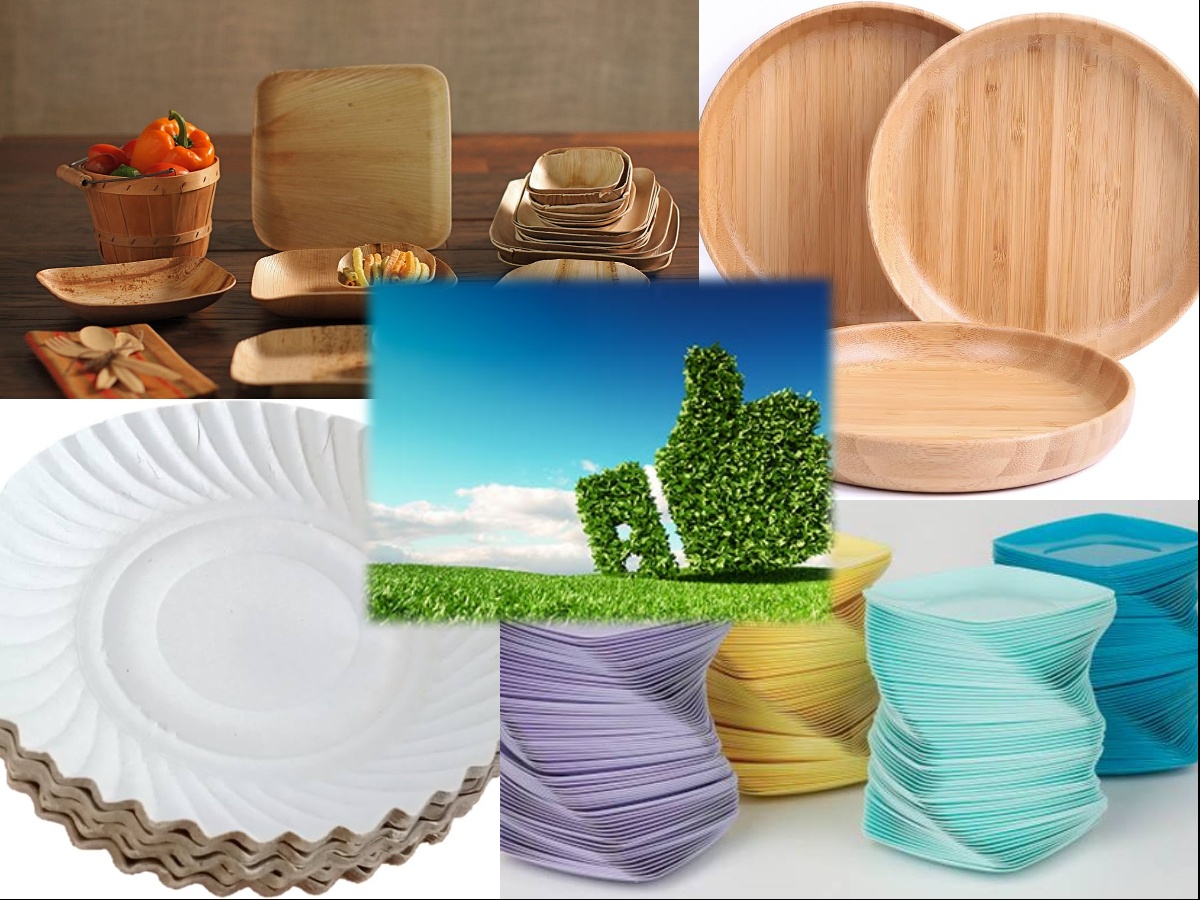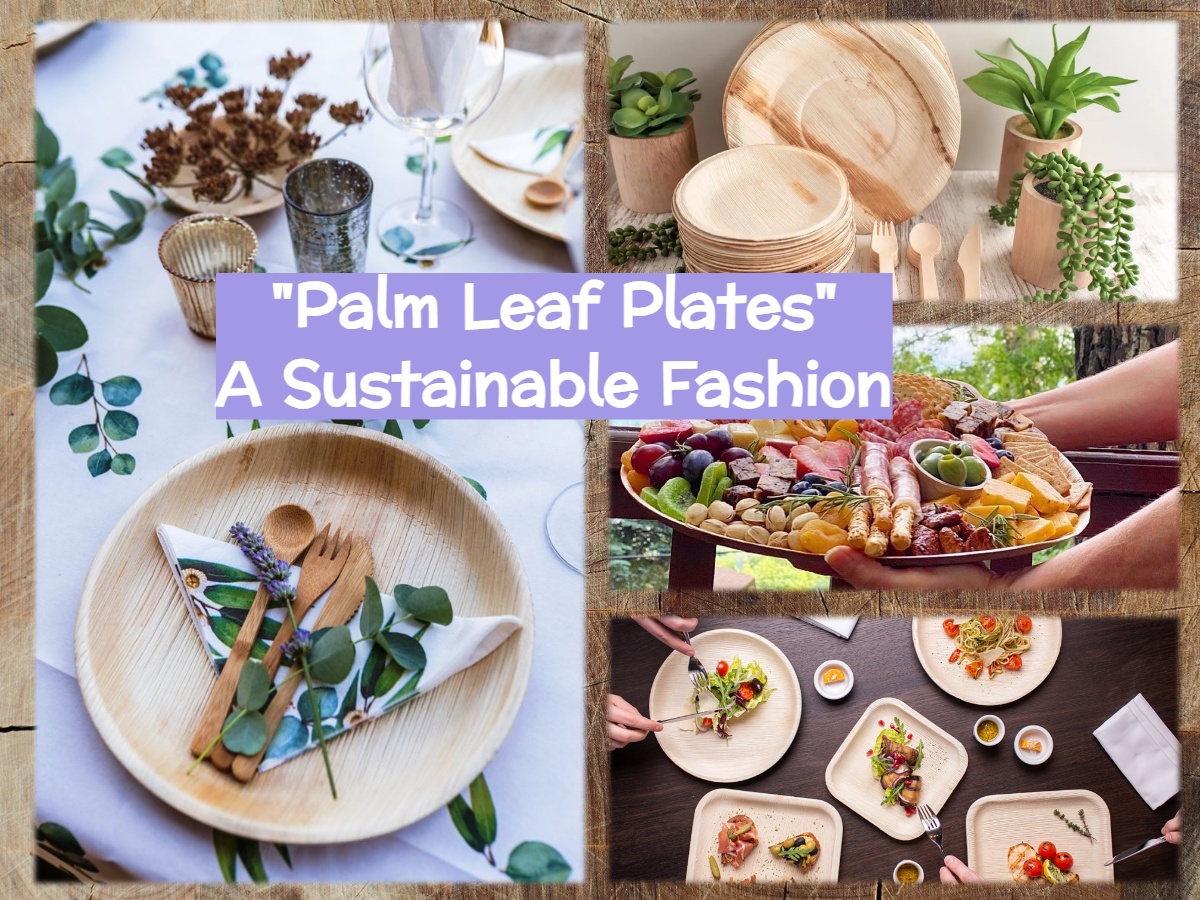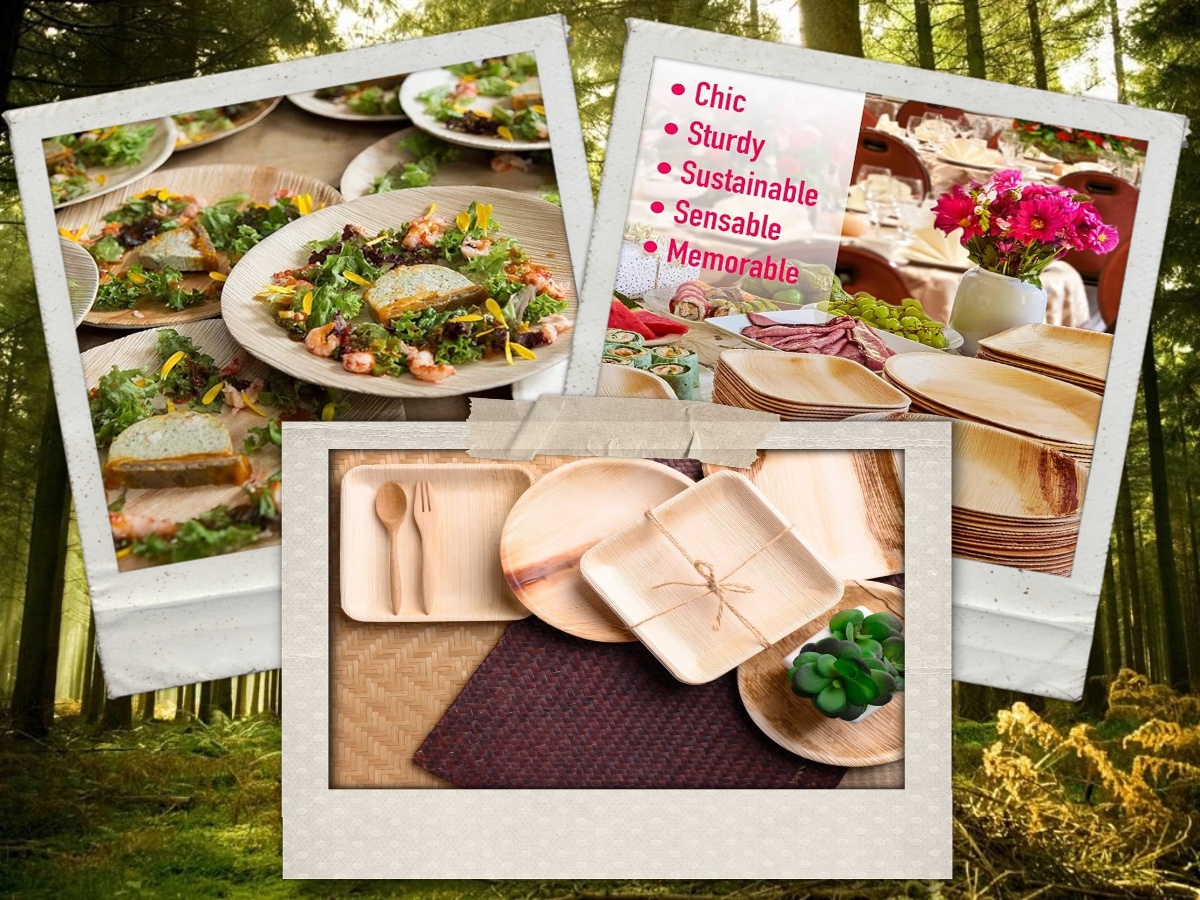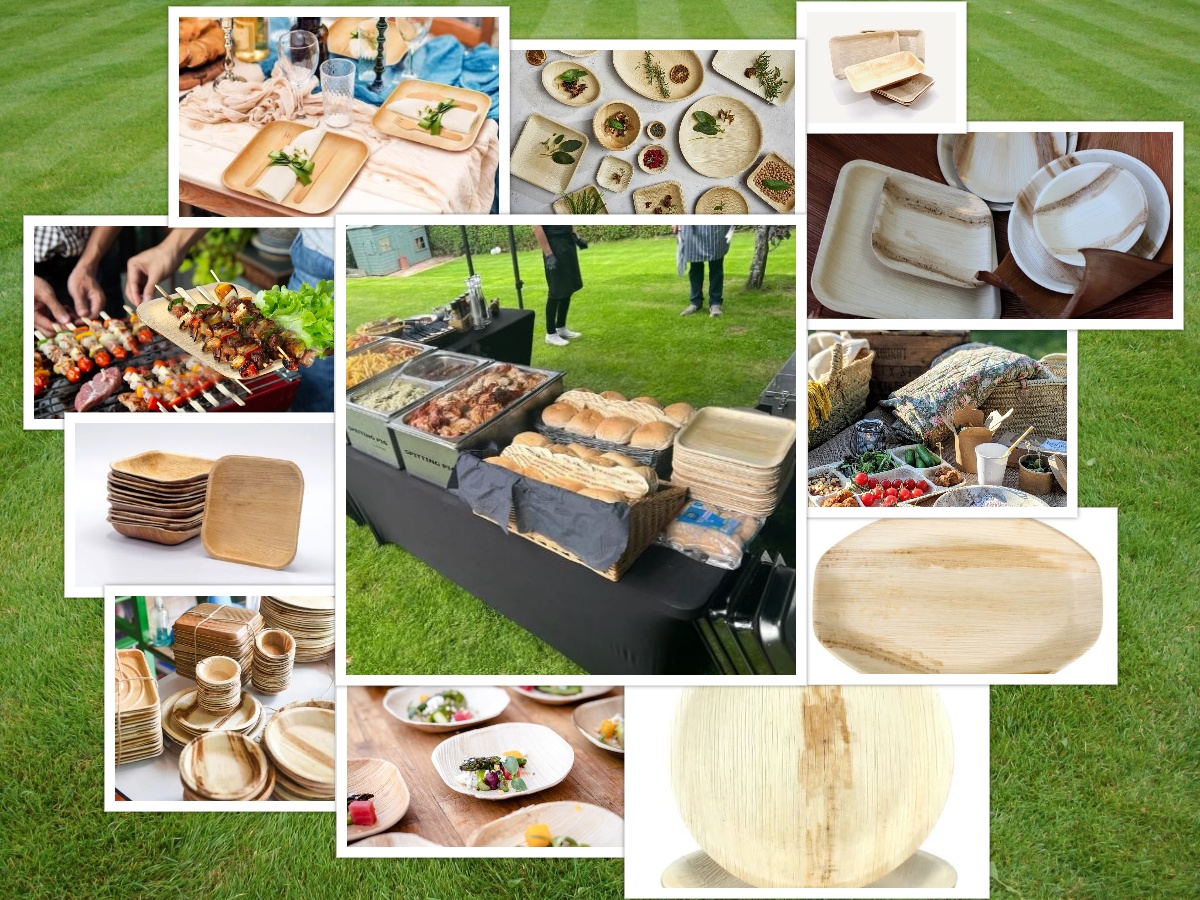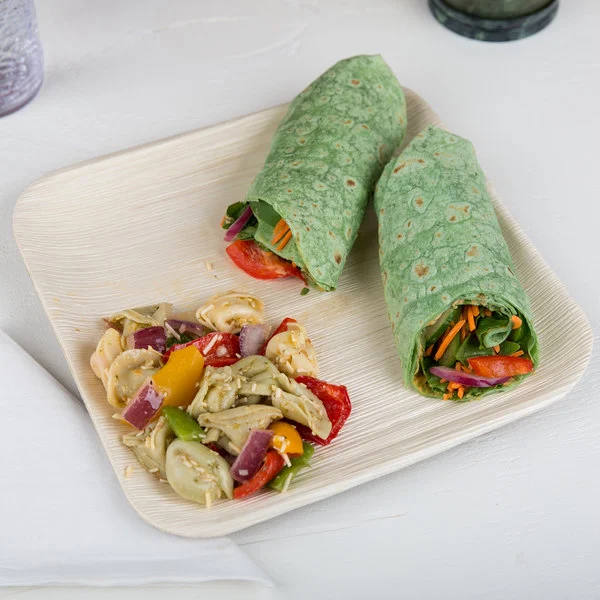In recent years, the importance of sustainability has become increasingly apparent, with more individuals and businesses striving to minimize their environmental impact. One area where this shift is evident is in the choice of disposable plates for events like parties, gatherings, and picnics.
In this article, we’ll compare alternatives to help you make an informed decision for your next eco-friendly event. Also, we’ll give you some tips for disposing of plates in an eco-friendly manner.
Listings Are:
Palm Leaf Plates:

- Palm leaf plates are crafted from naturally fallen palm leaves, making them a sustainable and biodegradable option.
- They are sturdy, heat-resistant, and suitable for both hot and cold foods, making them ideal for a variety of dishes.
- Their rustic appearance adds a charming touch to any event, and they are often compostable, further reducing their environmental impact.
Pros:
- Biodegradable and compostable.
- Sturdy and suitable for hot and cold foods.
- Rustic appearance adds aesthetic appeal.
- Made from naturally fallen leaves, minimizing environmental impact.
Cons:
- Can be more expensive compared to other disposable options.
- Limited availability in some regions.
- May vary in quality depending on the manufacturer.
Recycled Plastic Plates:

- Recycled plastic plates are made from post-consumer or post-industrial plastic, diverting waste from landfills and reducing the need for virgin plastic production.
- They are durable and lightweight, making them convenient for outdoor events.
- However, concerns about plastic pollution and recycling limitations often overshadow their environmental benefits.
Pros:
- Diverts plastic waste from landfills.
- Durable and lightweight.
- Widely available and affordable.
Cons:
- Contributes to plastic pollution.
- Recycling limitations and challenges.
- Not biodegradable or compostable.
Bamboo Plates:

- Bamboo plates are crafted from bamboo fibers, a renewable and fast-growing resource.
- They are sturdy, biodegradable, and often come in attractive designs, making them a popular choice for eco-conscious consumers.
- However, some bamboo plates may contain binders or chemicals, so it’s essential to choose products that are certified as food-safe and free from harmful additives.
Pros:
- Made from renewable bamboo fibers.
- Biodegradable and compostable.
- Sturdy and suitable for a variety of foods.
- Attractive designs and aesthetic appeal.
Cons:
- Some products may contain binders or chemicals.
- Quality may vary depending on the manufacturer.
- Limited availability in some regions.
Paper Plates:

Paper plates are a classic choice for disposable tableware, but their environmental impact can be significant, especially if they are not made from recycled or sustainably sourced materials. While they are biodegradable and compostable, the production process often involves deforestation and chemical treatments.
Pros:
- Biodegradable and compostable.
- Lightweight and convenient.
- Widely available and affordable.
Cons:
- Can contribute to deforestation.
- Often treated with chemicals for strength and water resistance.
- Not as durable as other options, may become soggy with wet or oily foods.
Tips for Disposing of Eco-Friendly Plates:
Proper disposal of plates after a party is essential for minimizing environmental impact and ensuring waste is managed responsibly. Here are some tips for disposing of plates in an eco-friendly manner:
1. Palm Leaf Plates:
- Composting:
- Palm leaf plates are biodegradable and suitable for composting.
- After use, collect them separately and place them in a compost bin.
- Ensure they are free of any food residues before composting.
- Natural Decomposition:
- If composting facilities are not available, palm leaf plates will naturally decompose over time.
- You can bury them in your backyard or garden, where they will break down into organic matter.
2. Recycled Plastic Plates:
- Check Local Recycling Guidelines:
- While some municipalities accept certain types of plastic for recycling, others may not.
- Check with your local recycling program to see if they accept recycled plastic plates.
- If accepted, rinse the plates to remove any food residue and place them in the recycling bin.
- Reuse or Repurpose:
- Consider washing and storing the plastic plates for future use.
- Reusing them reduces waste and extends their lifespan.
- Alternatively, you can repurpose them for arts and crafts projects or donate them to schools or community centers.
3. Bamboo Plates:
- Composting:
- Like palm leaf plates, bamboo plates are biodegradable and suitable for composting.
- After use, collect them separately and add them to your compost bin.
- Ensure they are clean and free of any food residues before composting.
- Natural Decomposition:
- If composting is not an option, bamboo plates will naturally decompose over time.
- You can bury them in your backyard or garden, where they will break down without harming the environment.
4. Paper Plates:
- Composting:
- Paper plates made from uncoated, biodegradable materials are suitable for composting.
- Place them in a compost bin along with other organic waste.
- Ensure they are free of any plastic coatings or contaminants before composting.
- Recycling:
- If the paper plates are not compostable, check if they are recyclable.
- Rinse off any food residues and place them in the recycling bin.
- Avoid contaminating the recycling stream with non-recyclable materials.
- Reduce Usage:
- Consider reducing the use of paper plates altogether by opting for reusable alternatives or encouraging guests to bring their own plates.
- Minimizing paper plate usage helps reduce waste and conserves natural resources.
Conclusion:
When choosing eco-friendly plates for your party, gathering, or picnic, it’s essential to consider the environmental impact, durability, and suitability for your needs.
Palm leaf plates, bamboo plates, and recycled plastic plates offer sustainable alternatives to traditional paper plates, with each option presenting its own set of advantages and drawbacks.
Ultimately, the best choice will depend on your priorities and preferences, but opting for reusable or compostable alternatives is a step towards reducing waste and promoting sustainability in our communities.






